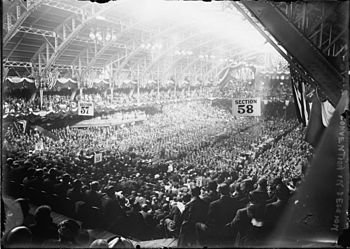
Republican presidential nominee Donald Trump says Libertarian presidential nominee Gary Johnson is a “fringe candidate.” I’m not sure what definition of “fringe” Trump is using. Johnson is a former governor, elected twice as a Republican in a Democrat-leaning state. Trump’s main presidential qualification seems to be his legendary skill at trolling his opponents on Twitter.
Democratic presidential nominee Hillary Clinton hasn’t deigned to notice likely Green Party candidate Jill Stein. Instead she’s dispatched proxies like runner-up Bernie Sanders (“We have got to defeat Donald Trump. And we have got to elect Hillary Clinton and Tim Kaine. … this is the real world that we live in”) to heap scorn on the practicality of a post-Philadelphia campaign from Clinton’s left.
OK, I admit it: History and money say the odds are with Donald Trump and Hillary Clinton — that one of them will be the next president of the United States. The last time a third party or independent candidate really threatened to win the White House was 1992, when Ross Perot knocked down nearly 20% of the popular vote, having at one time polled ahead of both Republican incumbent George HW Bush and the eventual winner, Democratic nominee Bill Clinton.
But it’s strange year. It feels like almost anything could happen. And while Clinton and Trump are the frontrunners, the field is, well, YUGE.
As of July 27, the Federal Elections Commission lists 1,814 candidates for president on its web site.
It’s true that some of them have dropped out, or have been eliminated in party nomination processes, or haven’t done anything EXCEPT file an FEC “statement of candidacy.” Most of them won’t appear on any state ballots, or even register themselves with election authorities as write-in options.
On the other hand, some candidates who haven’t submitted FEC statements may show up on your ballot this November. Candidates are only required to file an FEC Form 2 once they’ve raised or spent $5,000. In some states, ballot access doesn’t cost that much.
If you’re an American voter, you have options. Republicans and Democrats will tell you that you’re “wasting your vote” if you don’t pick one of the two leading brands. I don’t think they’re right — what’s the point of voting if you’re not voting for who or what you actually support? — but even if they’re right, well, it’s your vote to waste, isn’t it?
For once I agree with Ted Cruz: If you vote, vote your conscience.
Thomas L. Knapp (Twitter: @thomaslknapp) is director and senior news analyst at the William Lloyd Garrison Center for Libertarian Advocacy Journalism (thegarrisoncenter.org). He lives and works in north central Florida.
PUBLICATION/CITATION HISTORY
- “Think three’s a crowd? Try 2,000,” by Thomas L. Knapp, St. George, Utah Spectrum, 07/27/16
- “Election 2016: Think Three’s a Crowd? Try 2,000,” by Thomas L. Knapp, Ventura County, California Citizens Journal, 07/27/16
- “Election 2016: Think Three’s a Crowd? Try 2,000,” by Thomas L. Knapp, OpEdNews, 07/27/16
- “Election 2016: Think Three’s a Crowd? Try 2,000,” by Thomas L. Knapp, CounterPunch, 07/28/16
- “Election 2016: Think three’s a crowd? Try 2000,” by Thomas L. Knapp, Pahrump Valley, Nevada Times, 07/29/16
- “Election 2016 — Think three’s a crowd? Try 2,000,” by Thomas L. Knapp, Newberry, South Carolina Observer, 07/29/16
- “Election 2016: Think three’s a crowd? Try 2,000,” by Thomas L. Knapp, Dover, New Hampshire Foster’s Daily Democrat, 08/01/16
- “Election 2016: Think three’s a crowd? Try 2,000,” by Thomas L. Knapp, Fayette, West Virginia Tribune, 08/01/16
- “Think 3’s a crowd? Try 2,000,” by Thomas L. Knapp, Orangeburg, South Carolina Times & Democrat, 08/02/16
- “Election 2016: Think three’s a crowd? Try 2,000,” by Thomas L. Knapp, Montgomery, West Virginia Herald, 08/02/16
- “Election 2016: You have more than two choices,” by Thomas L. Knapp, Columbia, South Carolina Panorama, 08/02/16
- “Think three’s a crowd? Try 2,000,” by Thomas L. Knapp, Pacific Daily News [Guam], 07/28/16
- “Think three’s a crowd? Try 2,000,” by Thomas L. Knapp, Green Bay, Wisconsin Press-Gazette, 07/28/16


